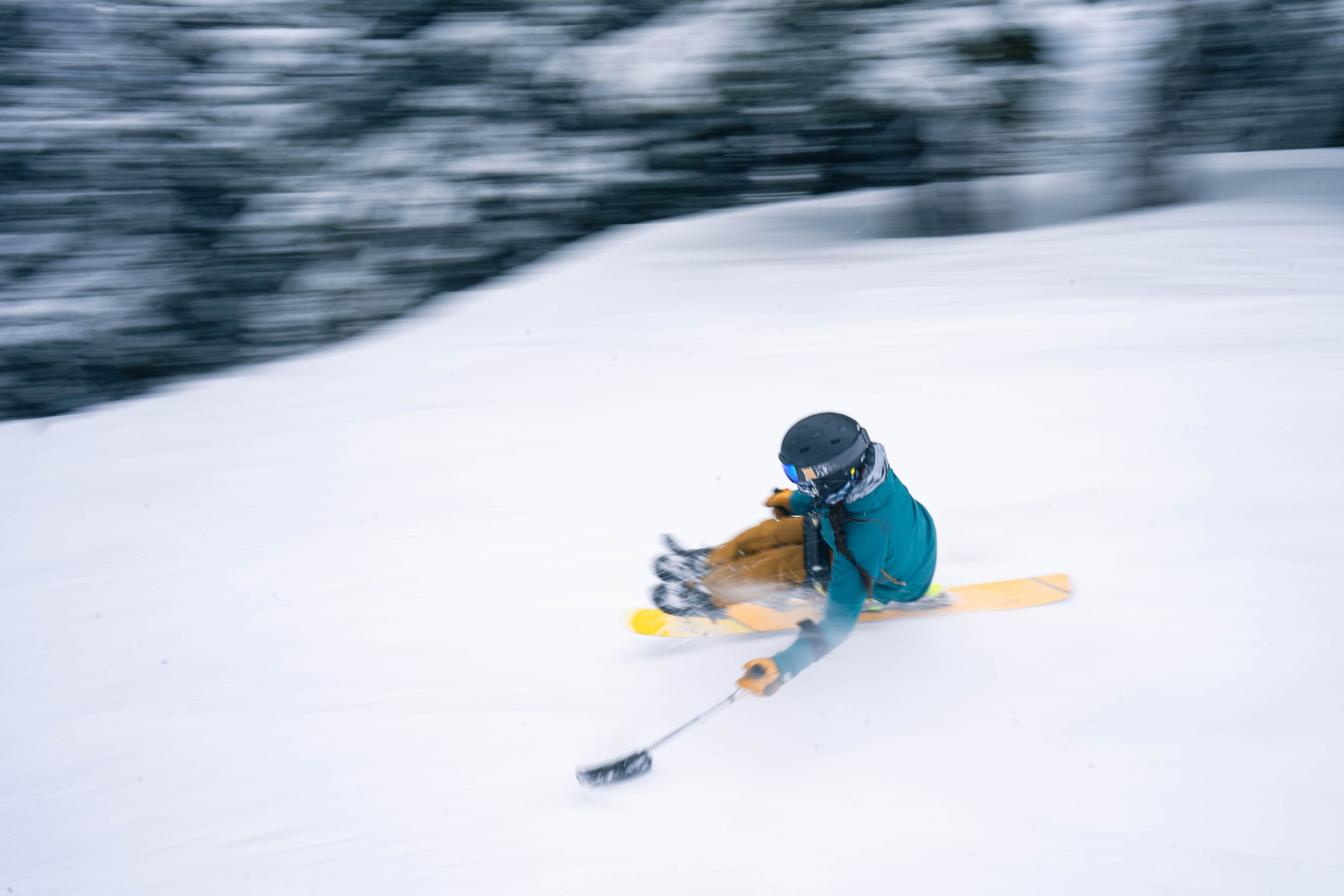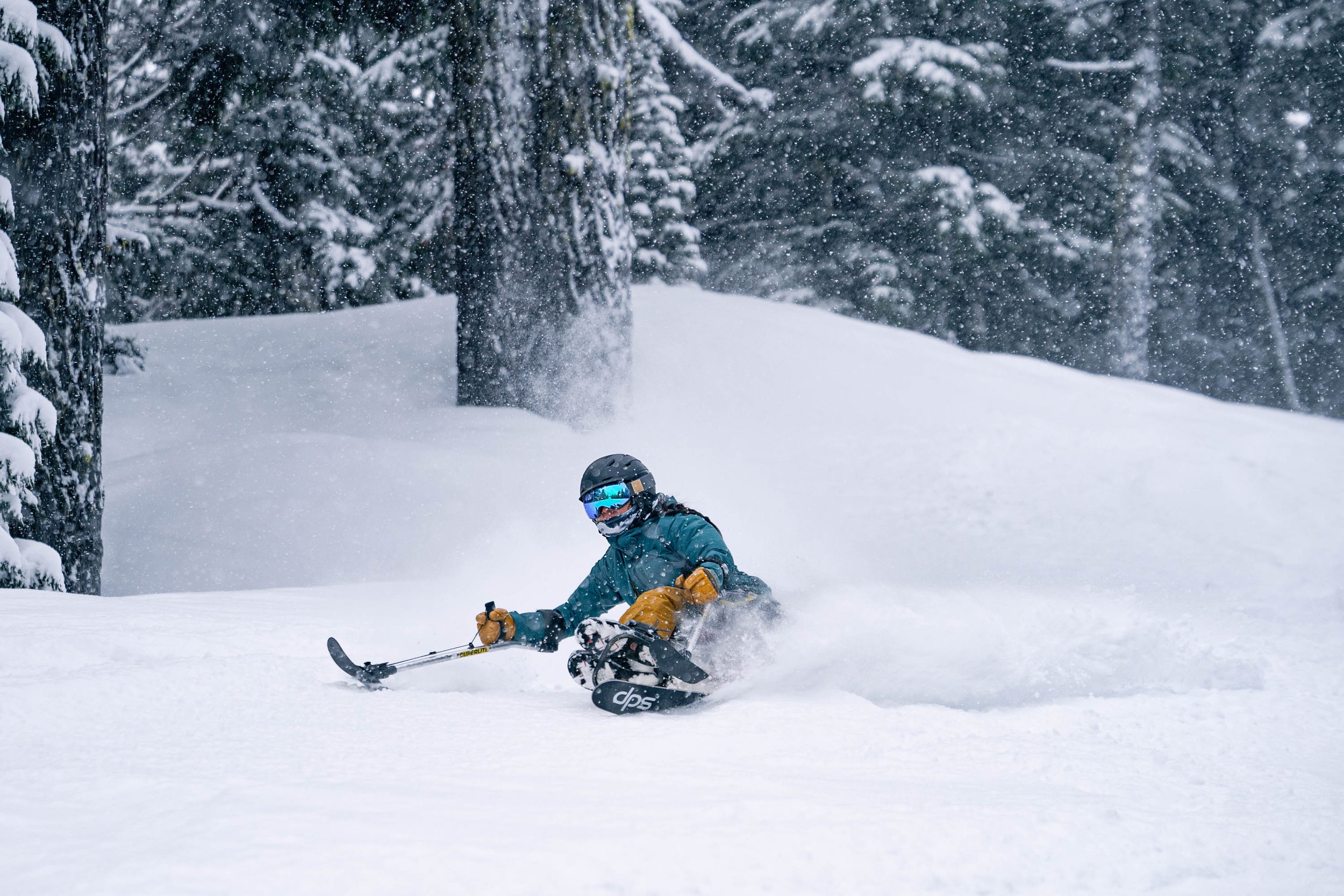Anna Soens
Primary Outdoor Sports: Skiing, Mountain Biking, Boating
Favorite Beverage: Gin & Tonic
Sunrise of Sunset: Sunset
Non-Outdoor Hobby: Drawing
Go-To Trail Snack: Gummy Bears
Favorite Season: Spring
Fun Fact: I once drank 6 liters of soda for $100
Hot Take: Regular Oreos are far superior to Double Stuffed
Three Words to Describe You: Stubborn, Independent, Adaptable
“I grew up in Wisconsin, so outdoors was either on a tennis court or a soccer field. I started sailing in middle school or high school. I would do that in the summers, extended trips like a week at a time. I think that's what first got me into the value of disconnecting from urban areas. But yeah, growing up in Wisconsin I felt like my eyes were always on the horizon, just restless.”
“I'm a wildlife biologist so when I found myself out west, I started picking up seasonal field jobs that required a lot of camping, hiking, and stuff like that.
That got me into climbing. Climbing was my sport. I think what drew me to it was that it could be as challenging or as chill as you wanted it to be. It had the potential to challenge you physically, mentally, and technically. There are so many different aspects to climbing that you really have to be on top of to be successful.”
“I ended up breaking my back in a climbing fall. Waking up with a spinal cord injury was the scariest thing to me, all of a sudden not being able to do the things I loved. Not being able to just camp and hike and climb on a whim. Not being able to get to these remote outdoor spaces that I loved because so much of that was part of my identity at the time.
I was tracking mountain lions for my job at the time. It was my dream come true. I was literally just sleeping in a backpacking tent for eight months out of the year and going and looking for wildlife for two weeks at a time. Then, on my week off I’d go climbing. It was a life built on perpetual motion and endless freedom.
Ending up in a hospital bed and not being able to move and thinking, ‘Oh shit. Is the rest of my life confined to pavement? I don't know what that looks like. I don't know how to handle that.’ It was the loss of freedom that was more paralyzing than the physical paralysis.
I spent a year after my injury just focusing on PT and just kind of relearning how to live life from a different perspective, different angle. I slowly found my way into adaptive sports, this whole arena that I'd never known about. It was like, ‘Oh hey, I can still get outdoors and I can still hit dirt.’”
“My first piece of adaptive equipment was my adaptive mountain bike and that for me was kind of like being able to reclaim some of my identity, just getting off pavement and back into the forest.
Skiing has been the most empowering adaptive sport that I found. I have another para-friend who sit skis and he's described it as the one sport that kind of puts us back on an even playing field.
I enjoy my bike and it's a good workout, but it is not the equivalent to an able bodied biker on two wheels. My biceps are just nowhere near as strong as somebody's quads. It's a little bit of a sufferfest.
But skiing is faster paced. I can ski anything on this mountain that anyone else can so it's kind of liberating that way. I can go fast. I can cruise around. I don't feel disabled when I'm skiing.”
“I have a fairly low level injury, so I have climbed my way up a couple mountains. I can crutch which has been slow, but those have probably been my most gratifying ski experiences, earning those turns. Logistically and physically, it’s just more complicated.
I climbed Mt. Hood a couple years after I fell. My dad and I had talked about climbing it together before I fell and those plans obviously got put on hold for a while. I didn't know if it would actually ever happen. Six months to a year after, I started contemplating it again having no idea what it would look like.
Me and my dad and a bunch of skier friends started just kind of brainstorming and trial and erroring around town. Climbing up Tumalo and just demoing gear that we were jerry-rigging.
It took a couple of days. My dad was totally spent, but standing on top of the summit with him was pretty emotional. That expedition for me was kind of reclaiming what I had lost and kind of proving, at least to myself, that my spinal cord injury wasn't going to keep me from doing the things that I wanted to do.
Going from originally being told in the hospital that I would never walk again and navigating all of those fears and unknowns in the year after my initial injury to being able to successfully stand on top of a mountain with my dad was pretty awesome.”
“The next year, a lot of the same crew did Mt. Baker. The start of it is a relatively low grade, which for me is a lot harder. It's easy for me to kind of bear crawl up a 40 degree pitch. The lower angle slog when I'm just crutching and post-holing through snow is physically exhausting because you're trying to maintain balance and doing a thousand tricep dips. I've never been more tired in my whole life.
If Hood was about reclaiming the past, Baker was something I had never thought about before. It was kind of like, ‘Oh, this is my trajectory now, and I can do kind of anything I want.’”
“I feel totally imbalanced if I don't get outside. It's a challenge. It's rejuvenation. It's being able to disconnect and kind of reset. It reminds me to be in the present and enjoy what's around rather than constantly being like, ‘What's tomorrow? What's happening? What am I late for? What am I doing?’ It's just like, ‘This is what I'm doing right now. These are the people with me. I'm just here to experience it and enjoy it.’ I think slowing down is a big piece of it.
And, I like being in places where you feel small and you feel like a cog in the world rather than the piece driving the world, which is very easy to do in your day to day life. I think it's good to be reminded of our place sometimes.”
“The non-negotiables that nature gives you are always changing and dynamic. I think that's what keeps it interesting. I don't like feeling like the master of the universe. I think that's why gnarly ski lines, whitewater, and overhung climbing routes are humbling, because there's no guarantee that you can do it. And, that’s where the interest is. I’m always pushing myself and trying to find steeper skiing, more technical terrain and I think there's always ways to push yourself.”
“I still miss a lot of the spontaneity I was able to have of just grabbing a pair of shoes and a bottle of water and disappearing. Whether it's skiing or biking or whatever, it's a little bit clunkier for me.
I go bikepacking with my husband and trying to find the perfect trail or a trail that goes is logistically complicated. You can do as much sat image research as you can, but you never really know if something goes till you are there.
And so for me, getting out into the backcountry or outdoor spaces is just a much slower pace than it used to be and I'm always ready for things to go wrong or mentally prepared to be turned around a mile in. You never know how it's going to go and at the same time you value and cherish every time you are out there.”






















